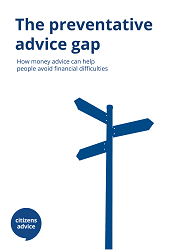The preventative advice gap: how money advice can help people avoid financial difficulties
Getting money advice can help people make the most of their budgets and avoid financial difficulties. That help is more important than ever as people’s finances become less stable, they are given greater responsibility for managing their money and low levels of financial capability persist.

One of the reasons people don’t get money advice is that it is not designed, or delivered, in a way that helps them avoid getting into financial difficulties.There is a preventative advice gap. The preventative advice gap: how money advice can help people avoid financial difficulties 687 KB identifies three causes of that gap:
Advice is not offered at crucial times in people’s lives - Up to 23 million people were not offered advice at key moments in their lives who may have taken it.
Advice is seen as a last resort- People don't seek money advice until they reach a crisis point like being unable to afford debt repayments. Consumers are nearly 50 per cent more likely to consider seeking help for a debt than for general money management.
Advice is too narrow - Over 1 million people who have had financial guidance did not get help with a related issue such as housing or work.
In the future, the funding, commissioning and delivery of money advice should be targeted to solve these problems to help people plan ahead, save for the future and make good financial decisions throughout their lives. Using evidence from interviews with advisers and advice service managers, this report sets out the benefits of this approach and offers examples of how this can be done which will be useful to commissioners and practitioners, showing that:
Advice can be targeted at people going through key life changes by providing advice alongside the services people already use.
Advice can be more responsive to unexpected changes in people’s circumstances and provided before those changes lead to financial difficulties.
Debt and money advice can be provided together and alongside general advice to deal with the root causes of people’s money problems.
As the government considers how best to support people with money and debt issues they should place prevention of financial difficulties at the heart of any changes. Preventative money advice, which proactively targets people at key life moments and responds to unexpected changes in their lives would help people avoid getting into financial difficulties and build their own financial resilience.